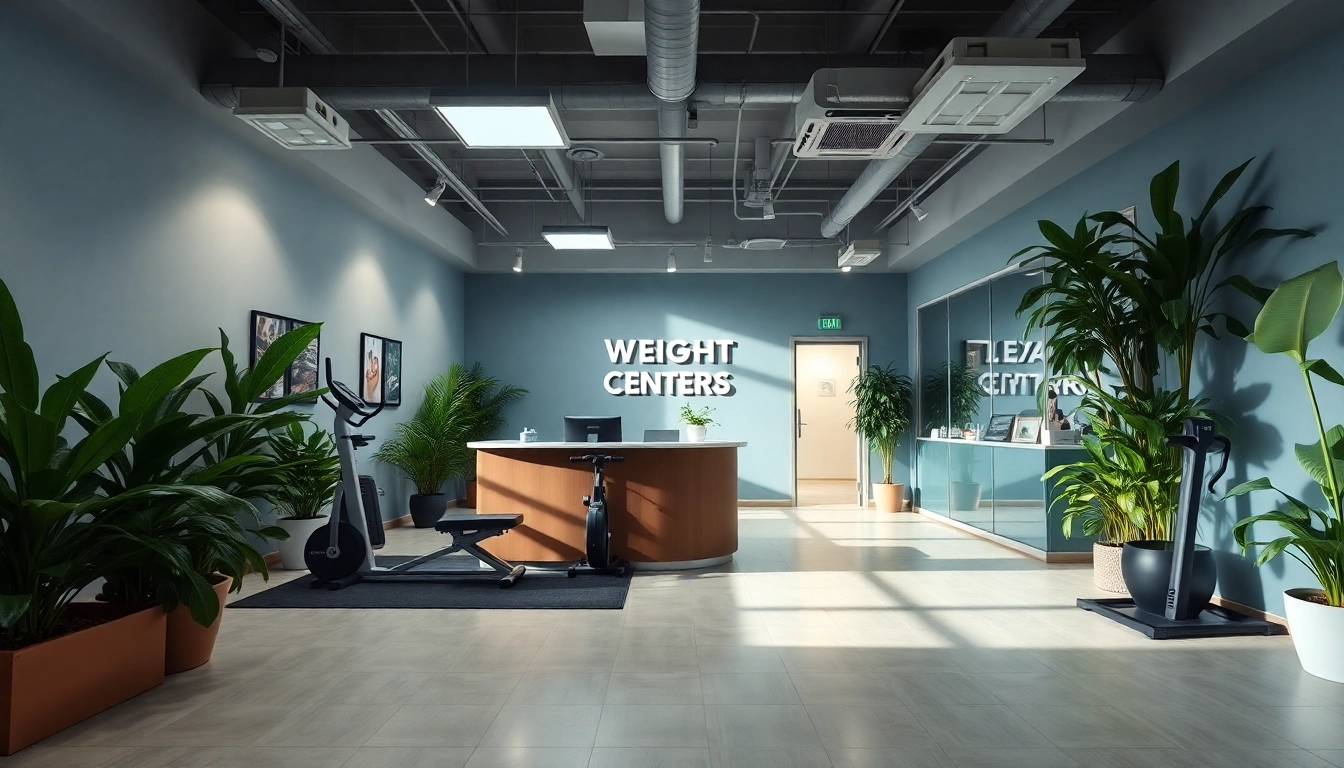Understanding Weight Loss Centers
Definition and Purpose
A weight loss center is a specialized facility dedicated to helping individuals achieve their weight loss goals through a combination of medical and wellness approaches. These centers offer structured programs that may include dietary plans, fitness regimens, behavioral therapy, and medical assistance. The primary purpose of these facilities is to provide a supportive environment that empowers clients to make lasting changes to their lifestyle, ultimately achieving a healthier weight and improving overall well-being.
Common Services Offered
Weight loss centers typically offer a wide range of services tailored to meet the specific needs of their clients. Some of the most common services include:
- Nutritional Counseling: Personalized dietary plans developed by registered dietitians to help clients understand the importance of nutrition in weight management.
- Fitness Assessments: Evaluation of current fitness levels, followed by the creation of tailored exercise programs designed to fit the client’s lifestyle and preferences.
- Behavioral Therapy: Psychological support to address emotional eating, motivation issues, and lifestyle changes necessary for long-term weight loss success.
- Medical Supervision: Regular check-ups with healthcare professionals to monitor health changes, nutritional deficiencies, and weight loss progress.
- Semi-Medical Interventions: Options such as weight loss medications, meal replacement plans, or even surgical weight loss procedures for eligible candidates.
Benefits of Utilizing a Weight Loss Center
Participating in a weight loss center can provide several benefits, such as:
- Structured Environment: Clients receive a clear roadmap and support throughout their weight loss journey, reducing the feelings of isolation.
- Expert Guidance: Access to trained professionals who understand the nuances of weight management creates a robust support system.
- Accountability: Regular check-ins and assessments keep clients motivated and committed to their goals.
- Comprehensive Approach: Combining medical, nutritional, and psychological perspectives allows for addressing all dimensions of weight loss.
- Long-Term Success: Evidence shows that those who engage with weight loss centers often achieve better outcomes compared to self-directed weight loss efforts.
Choosing the Right Weight Loss Center
Factors to Consider Before Enrolling
When selecting a weight loss center, it’s essential to consider various factors to ensure you choose a facility that aligns with your needs:
- Location: Proximity to your home, workplace, or school can facilitate consistent attendance.
- Services Offered: Ensure the center provides the specific services you require, such as medical guidance, nutritional counseling, or fitness classes.
- Staff Qualifications: Investigate the credentials and experience of the staff to ensure they are qualified to provide effective support.
- Cost: Inquire about the pricing structure, insurance acceptance, and any hidden fees to avoid unexpected expenses.
- Atmosphere: Visit the center to gauge whether the environment feels welcoming and supportive.
Consultations and Assessments
Most weight loss centers begin with an initial consultation, during which professionals will assess your individual needs and health status. This assessment often includes:
- Health History Review: Understanding any medical conditions or medications that might affect weight loss.
- Body Composition Analysis: Use of tools such as body fat percentage measurements or metabolic testing to provide a comprehensive view of your physical status.
- Goal Setting: Collaborating with a professional to establish realistic and measurable weight loss goals tailored to your lifestyle.
Client Reviews and Success Stories
Before enrolling, it can be beneficial to look for reviews or success stories from previous clients. Many centers publish testimonials showcasing the progress and experiences of those who attended. Consider these factors while reviewing:
- Realistic Outcomes: Look for clients who share their stories candidly, including challenges they faced, to understand what to expect.
- Long-Term Success: Review notes on whether clients maintained their weight loss over time, which indicates the effectiveness of the program.
- Personal Connections: Consider whether testimonials highlight a supportive environment and individualized attention.
Goals and Programs at Weight Loss Centers
Setting Realistic Weight Loss Goals
Establishing achievable weight loss goals is crucial for success. A weight loss center will help you set these goals based on various factors, including:
- Current Weight: Understanding where you’re starting from allows for a realistic pathway to your target.
- Health Objectives: Whether aiming for cosmetic changes, health benefits, or improved energy levels, these goals vary from person to person.
- Time Frame: Clients should consider how quickly they wish to achieve their goals; gradual weight loss often leads to better long-term adherence.
Popular Weight Loss Programs Explained
Weight loss centers typically offer a selection of popular programs, such as:
- Guided Meal Plans: Structured diets often include planned meals based on caloric requirements and nutritional balance.
- Group Therapy Sessions: Focusing on the psychological aspects of weight loss, these sessions foster sharing experiences and support.
- Boot Camp Classes: Intensive fitness sessions designed to accelerate weight loss and build camaraderie among participants.
Tailoring Programs to Individual Needs
One of the significant advantages of a weight loss center is the ability to customize programs based on individual client needs. Some considerations include:
- Dietary Preferences: Tailoring meal plans to accommodate allergies, food intolerances, or personal preferences (e.g., vegetarian, keto).
- Fitness Levels: Adjusting exercise programs based on pre-existing conditions or current fitness levels to ensure safety and effectiveness.
- Motivational Techniques: Employing different motivational approaches to engage clients uniquely, whether through challenges, rewards, or personal check-ins.
Nutrition and Diet Plans in a Weight Loss Center
Understanding Nutritional Guidelines
Nutritional education is central to the mission of weight loss centers. Understanding the balance of macronutrients—proteins, fats, and carbohydrates—is fundamental in creating effective meal plans. Common guidelines include:
- Portion Control: Clients learn to manage serving sizes to avoid excess calorie intake.
- Balanced Diet Components: Understanding the importance of including all food groups for optimal health and weight management.
- Hydration: Educating clients about the impact of hydration on metabolism and overall health.
How Weight Loss Centers Design Meal Plans
Meal plans offered by weight loss centers are meticulously designed considering individual preferences, dietary restrictions, and caloric goals. Elements of meal plan development include:
- Personal Indulgences: Incorporating favorite foods in moderation to promote happiness and adherence to the plan.
- Seasonal Freshness: Suggesting foods that are in season for better flavor and nutritional content.
- Meal Prep Strategies: Educating clients about prepping meals in advance to simplify adherence during busy weeks.
Importance of Dietary Education
Understanding the principles of nutrition is paramount for long-term success. Weight loss centers prioritize dietary education through:
- Workshops and Seminars: Interactive sessions provide information on topics ranging from label reading to meal prepping.
- Support Materials: Clients often receive handouts, recipes, and guides to take home, enhancing their understanding.
- Continuous Learning: Recognizing that education never ends, many centers encourage clients to continually seek knowledge about nutrition.
Tracking Progress and Staying Motivated
Monitoring Techniques Used in Weight Loss Centers
To effectively track weight loss progress, weight loss centers employ various monitoring techniques, such as:
- Regular Weigh-Ins: Clients are weighed at defined intervals to monitor changes in body weight as well as BMI calculations.
- Body Measurements: Tracking inches lost from specific areas can be a great motivator, highlighting health improvements rather than just the number on the scale.
- Health Assessments: Regular health evaluations can provide insight into metabolic health and inform necessary adjustments to the program.
Staying Accountable: Support Systems
Accountability is a crucial aspect of successful weight loss. Weight loss centers foster accountability through several support systems:
- Personal Coaches: Having a dedicated coach can provide motivation, encouragement, and personalized feedback throughout the journey.
- Group Connections: Sharing experiences with others on similar journeys creates a supportive community that promotes accountability.
- Progress Reports: Regular updates on progress help clients reconnect with their goals and visualize their achievements.
Celebrating Milestones and Success
Celebraating small victories is essential in maintaining motivation over time. Weight loss centers often recommend the following strategies for celebrating milestones:
- Personal Rewards: Clients are encouraged to reward themselves with non-food-related incentives such as new fitness gear, spa days, or social outings.
- Group Celebrations: Recognizing the achievements of all participants fosters a sense of community and shared triumph.
- Media Sharing: Many centers allow clients to share success stories via social media, inspiring others and holding themselves accountable.



